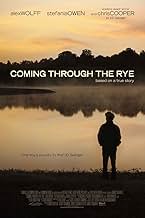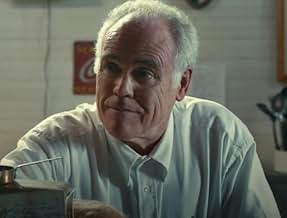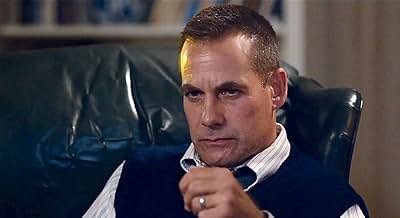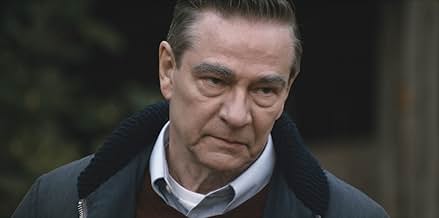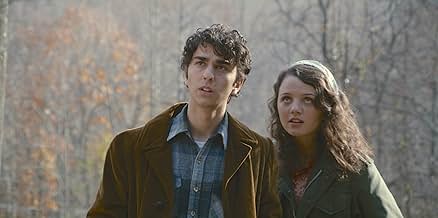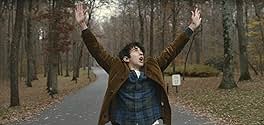NOTE IMDb
6,2/10
1,1 k
MA NOTE
Ajouter une intrigue dans votre langueIn 1969, the Holden Caulfield-obsessed Jamie Schwartz runs away from boarding school to find the reclusive author J.D. Salinger. Inspired by actual events, Jamie's search is a journey into t... Tout lireIn 1969, the Holden Caulfield-obsessed Jamie Schwartz runs away from boarding school to find the reclusive author J.D. Salinger. Inspired by actual events, Jamie's search is a journey into the meaning of friendship, love and loss.In 1969, the Holden Caulfield-obsessed Jamie Schwartz runs away from boarding school to find the reclusive author J.D. Salinger. Inspired by actual events, Jamie's search is a journey into the meaning of friendship, love and loss.
- Réalisation
- Scénario
- Casting principal
- Récompenses
- 12 victoires et 3 nominations au total
Stefania LaVie Owen
- Deedee
- (as Stefania Owen)
Melissa Lozoff
- Dot
- (as Melissa Ann Lozoff)
Robert C. Treveiler
- Dan
- (as Rob Trevelier)
Avis à la une
Many people will enjoy the crap out of this movie because of its angsty hero and the story of his perseverance in the face of a hostile world. The directional arc of this story is almost religious in its message of faith, of feeling chosen, of attempting to interpret the uninterpretable, and forcing yourself to push through the darkness. If that's what the movie had been about, it would have been an absolute masterpiece. Maybe I'm asking too much for a movie to be so aware of its message that its context and narrative go in that direction also.
Unfortunately, the movie is about the universal nature of the mythic Holden Caulfield character. The screenwriter has done exactly what Salinger told him not to do, to interpret the mythos and reduce it to a cheap psychoanalysis of what that character means. As a fan of the book myself, it's disheartening to see just how misinterpreted it becomes even in the most capable of hands.
Don't get me wrong, this movie is enjoyable in and of itself. The movie itself is great looking and moderately satisfying. Cooper is particularly enjoyable as the man himself, operating as both the wise man on the hill and the man behind the curtain. The filmmaker did a fine job with what he had to work with, which was a flawed script that comes to conclusions that don't quite fit together. The hero on a quest motif works extremely well here, but there were many missed opportunities on the journey to reach for more. The opening half-hour comes from a pretty dark and intense place, but that energy isn't sustained, as it instead veers into syrupy redemption rather than attempting to make any statements about where that darkness and intensity comes from. It's apparently enough just to state it exists, like the dragon that must either be slain or domesticated. I don't dislike this movie, but it's frustrating to see a fairly pat story applied to a very complex subject, and attempt to get away with it by shrugging about what it means. The story could very easily have been about what it means instead of simply the shrug.
Unfortunately, the movie is about the universal nature of the mythic Holden Caulfield character. The screenwriter has done exactly what Salinger told him not to do, to interpret the mythos and reduce it to a cheap psychoanalysis of what that character means. As a fan of the book myself, it's disheartening to see just how misinterpreted it becomes even in the most capable of hands.
Don't get me wrong, this movie is enjoyable in and of itself. The movie itself is great looking and moderately satisfying. Cooper is particularly enjoyable as the man himself, operating as both the wise man on the hill and the man behind the curtain. The filmmaker did a fine job with what he had to work with, which was a flawed script that comes to conclusions that don't quite fit together. The hero on a quest motif works extremely well here, but there were many missed opportunities on the journey to reach for more. The opening half-hour comes from a pretty dark and intense place, but that energy isn't sustained, as it instead veers into syrupy redemption rather than attempting to make any statements about where that darkness and intensity comes from. It's apparently enough just to state it exists, like the dragon that must either be slain or domesticated. I don't dislike this movie, but it's frustrating to see a fairly pat story applied to a very complex subject, and attempt to get away with it by shrugging about what it means. The story could very easily have been about what it means instead of simply the shrug.
Ah, the pain of the teenage years, especially when you're the scourge of your classmates. Coming through the Rye captures those times through such insightful, understanding eyes it seems a bit autobiographical; and sure enough, in the Q&A post screening at the Austin Film Festival, writer/director James Steven Sadwith acknowledged that he was the teenager with a passion for finding Salinger, and this film is based on his experience. Another interesting revelation during the session was that the film's star, Alex Wolff, related that his grandfather, father, and brother all passed the same copy of J. D. Salinger's Catcher in the Rye onto sons and brother when they were 12-13 years old.
The film opens with Jamie (Wolff) having heart-to-heart talks about girls with his older brother Gerry, who has gotten involved in drugs, and is being sent to a treatment center. He thinks he might not go, though, and instead join the armed services (this is the late '60s and the Viet Nam war is ongoing.) Soon after, Jamie is sent to Crampton boarding school and eventually becomes a pariah who is bullied unmercifully.
Jamie decides he's had it when he is awakened and attacked in the middle of the night and his room is left in shambles. At that point he decides to run away. Where to? To find J. D. Salinger, his idol. He has so identified with Holden Caulfield in Catcher in the Rye, he has written a screenplay for a theater production. Upon being told that he must get permission from Salinger before it can be performed, and running up against all kinds of obstacles in the mail, he thinks the only way is to talk to Salinger in person. He has no car, so must hitchhike his way to Vermont where he's told Salinger lives.
The person who picks him up is actually his "townie" friend, Deedee (Owen), who is a motherly sort and worries about his safety. She gets permission from her parents to drive Jamie up to Vermont just for the weekend, hoping to convince him to return to Crampton after their search. I loved her reasoning when she appeals to her reasonable parents; they end up trusting her and giving her room to use her own judgment.
Well, people have been trying for years to find Salinger, who just wants to be left alone. During their search, Jamie and Deedee talk about all kinds of things, and she, who is wise beyond her years, offers comments meant to increase his self-awareness. The film then gets into more coming-of-age dynamics, and ends on valuable moments of truth.
Among all the films about/for teenagers, Sadwith's production is one of the most thoughtful and edifying. Problems are cogently presented, and the model of Deedee's friendship and support of Jamie is exemplary in tone and execution. The scenes of young love are touching and funny, beautiful and awkward. Above all, the script is sound in its cause/consequences connections. Eric Hurt's cinematography, especially the sequences outdoors, takes you right into the action and gives you the feeling of being in the film. Similarly the music by Greg LaFollette, Heath McNease, and Jay Nash enhances the story, with the lyrics elaborating on the action.
The actors cast for Coming through the Rye seems tailor made for the film. Alex Wolff epitomizes the cautious, brainy kind of kid who doesn't quite grasp why anyone would be against him, although he is sincere and thoughtful. It takes another kind-hearted person to gently bring him to acknowledge his weaknesses and deal openly with a major trauma. Stephania Owen is peppy as Deedee and portrays so well the girl/woman who can be such a valuable friend, but may not be the object of passion.
Finally, Chris Cooper, the accomplished actor who has not always received the recognition he deserves, is ideal in the role of Salinger, in his identification with a famous person who does not strive for the limelight. He can be gruff and dismissive, but is clearly attentive to what he sees and hears, and can shift his position in response to a logical or appealing plea—much like the character he plays in August: Osage County as patient and kind, but whose support has limits.
Above the norm for movies about teens.
Grade: A By Donna R. Copeland
The film opens with Jamie (Wolff) having heart-to-heart talks about girls with his older brother Gerry, who has gotten involved in drugs, and is being sent to a treatment center. He thinks he might not go, though, and instead join the armed services (this is the late '60s and the Viet Nam war is ongoing.) Soon after, Jamie is sent to Crampton boarding school and eventually becomes a pariah who is bullied unmercifully.
Jamie decides he's had it when he is awakened and attacked in the middle of the night and his room is left in shambles. At that point he decides to run away. Where to? To find J. D. Salinger, his idol. He has so identified with Holden Caulfield in Catcher in the Rye, he has written a screenplay for a theater production. Upon being told that he must get permission from Salinger before it can be performed, and running up against all kinds of obstacles in the mail, he thinks the only way is to talk to Salinger in person. He has no car, so must hitchhike his way to Vermont where he's told Salinger lives.
The person who picks him up is actually his "townie" friend, Deedee (Owen), who is a motherly sort and worries about his safety. She gets permission from her parents to drive Jamie up to Vermont just for the weekend, hoping to convince him to return to Crampton after their search. I loved her reasoning when she appeals to her reasonable parents; they end up trusting her and giving her room to use her own judgment.
Well, people have been trying for years to find Salinger, who just wants to be left alone. During their search, Jamie and Deedee talk about all kinds of things, and she, who is wise beyond her years, offers comments meant to increase his self-awareness. The film then gets into more coming-of-age dynamics, and ends on valuable moments of truth.
Among all the films about/for teenagers, Sadwith's production is one of the most thoughtful and edifying. Problems are cogently presented, and the model of Deedee's friendship and support of Jamie is exemplary in tone and execution. The scenes of young love are touching and funny, beautiful and awkward. Above all, the script is sound in its cause/consequences connections. Eric Hurt's cinematography, especially the sequences outdoors, takes you right into the action and gives you the feeling of being in the film. Similarly the music by Greg LaFollette, Heath McNease, and Jay Nash enhances the story, with the lyrics elaborating on the action.
The actors cast for Coming through the Rye seems tailor made for the film. Alex Wolff epitomizes the cautious, brainy kind of kid who doesn't quite grasp why anyone would be against him, although he is sincere and thoughtful. It takes another kind-hearted person to gently bring him to acknowledge his weaknesses and deal openly with a major trauma. Stephania Owen is peppy as Deedee and portrays so well the girl/woman who can be such a valuable friend, but may not be the object of passion.
Finally, Chris Cooper, the accomplished actor who has not always received the recognition he deserves, is ideal in the role of Salinger, in his identification with a famous person who does not strive for the limelight. He can be gruff and dismissive, but is clearly attentive to what he sees and hears, and can shift his position in response to a logical or appealing plea—much like the character he plays in August: Osage County as patient and kind, but whose support has limits.
Above the norm for movies about teens.
Grade: A By Donna R. Copeland
In 1969 a persecuted prep school student in Pennsylvania (Alex Wolff) runs away to find the author of "Catcher in the Rye" in the hills of New Hampshire to get his permission to produce a play based on his classic novel. Stefania LaVie Owen is on hand as the girl from a nearby school whom he travels with while Chris Cooper plays the curmudgeonly recluse J.D. Salinger.
"Coming through the Rye" (2015) is a coming-of-age drama based on a true story. Being set in an all-male boarding school with sequences involving a female school, you can't help but compare it with "Dead Poets Society" (1989). While it's not great like that movie, it's quite good. They're really not that similar in the first place because "Coming through the Rye" is just as much of a road movie as it is a historical boarding school flick.
Wolff is good as the likable & sympathetic protagonist while Stefania is a winsome cutie. The story takes off when the two team-up in the second act. Their honest relationship is the core of the tale with the boy's possible interactions with the author playing a secondary role.
Someone called the movie "phony" because Salinger's classic book looked "down upon those who refuse to accept life as anything other than miserable and unforgiving. Its sincerity is guided by distrust in others and it spits in the face of affection and benevolence." Gee, ya think that might be why Salinger is depicted as an antisocial curmudgeon in the movie? Besides, it can't be too phony if the events are based on a true story with 90% accuracy according to writer/director James Steven Sadwith.
The film runs 1 hour, 37 minutes and was shot in Orange County, Virginia. Speaking of which, the gorgeous Eastern locations are a huge plus.
GRADE: B
"Coming through the Rye" (2015) is a coming-of-age drama based on a true story. Being set in an all-male boarding school with sequences involving a female school, you can't help but compare it with "Dead Poets Society" (1989). While it's not great like that movie, it's quite good. They're really not that similar in the first place because "Coming through the Rye" is just as much of a road movie as it is a historical boarding school flick.
Wolff is good as the likable & sympathetic protagonist while Stefania is a winsome cutie. The story takes off when the two team-up in the second act. Their honest relationship is the core of the tale with the boy's possible interactions with the author playing a secondary role.
Someone called the movie "phony" because Salinger's classic book looked "down upon those who refuse to accept life as anything other than miserable and unforgiving. Its sincerity is guided by distrust in others and it spits in the face of affection and benevolence." Gee, ya think that might be why Salinger is depicted as an antisocial curmudgeon in the movie? Besides, it can't be too phony if the events are based on a true story with 90% accuracy according to writer/director James Steven Sadwith.
The film runs 1 hour, 37 minutes and was shot in Orange County, Virginia. Speaking of which, the gorgeous Eastern locations are a huge plus.
GRADE: B
This is a winner. Believable acting, tight script, fine camera work. I've not read the book... This film makes me want to. Best parts were when Jamie speaks directly to us, and when he spoke directly to me. Reminded me of things I've not even now have had sorted out concerning my own high school experience.
Every "Catcher" reader will tell you that you don't need to relate to Holden, don't need to agree with Holden, hell, you don't even need to like him—to know how honest and raw he is with his reader. The reader knows more than Holden does at times, in spite of the walking contradiction that he is. J.D. Salinger wrote "The Catcher" out of desperation. He wrote it trying to hold on to parts of himself that he hadn't even fed in years. And this is apparent upon a first read, seeing that Holden's values are so rooted in who he is—but then not a page later they are replaced entirely. This film was not comprised out of that same desperation, it was composed of admiration, of love for the words that helped to inspire and not just numb. This is a glass and hard plastic reverence to what was once a leather-bound vow; finding your own story, making something of yourself, and searching out your spot to stand and hold the fabric of the world together. This film radiates the feeling of knowing who you ought to be, thinking that's all you could ever be, and then before the credits have rolled crumpling up all the words that used to define you. This film may not be everything that you will hope it to be at times, but it certainly won't all be what you expect. And if that were it's only connection to The Catcher in the Rye, that would be enough to earn the title. But it also develops real characters, and real heartbreak, real headway, and real authentic cinematography. By the end of the film, you thank the director and his fearless cast for leaving the camera rolling long enough to make you itch. If you can manage your own discomfort in those raw moments, you will appreciate how they opted away from "seamless." If only to make a jagged representation of what will always be an honest story, with honest feeling—not written for one person—but for generations to know that they weren't the first to love or hate Holden Caulfield...or Jamie Schwartz for that matter. And they won't be the last.
Le saviez-vous
- AnecdotesThe film was shot at Orange County, Virginia.
- GaffesAbout 13 minutes in, the main character states, "Apparently before Mr. Cerf was ever famous, he started Random House books which happens to be the company that put The Catcher in the Rye in print." Little Brown was, in fact, the publisher.
- Crédits fousThe end credits include the disclaimer that "The characters and events portrayed in this motion picture are fictitious" even though J.D. Salinger is clearly a real person and the opening credits include a statement that this movie is based on real events.
- Bandes originalesIf I Were Free
Written by Alex Ebert (ASCAP) / Nico Aglietti (BMI) / Mark Noseworthy(ASCAP) / Joshua Collazo (ASCAP) / Seth Ford-Young(ASCAP)
Performed by Edward Sharpe and the Magnetic Zeros
Courtesy of Community Music/Vagrant Records
By arrangement with BMG Chrysalis
Meilleurs choix
Connectez-vous pour évaluer et suivre la liste de favoris afin de recevoir des recommandations personnalisées
- How long is Coming Through the Rye?Alimenté par Alexa
Détails
- Date de sortie
- Pays d’origine
- Sites officiels
- Langue
- Aussi connu sous le nom de
- Пробираясь сквозь рожь
- Lieux de tournage
- Sociétés de production
- Voir plus de crédits d'entreprise sur IMDbPro
Box-office
- Montant brut aux États-Unis et au Canada
- 18 137 $US
- Week-end de sortie aux États-Unis et au Canada
- 3 761 $US
- 16 oct. 2016
- Montant brut mondial
- 18 137 $US
- Durée1 heure 37 minutes
- Couleur
- Rapport de forme
- 2.35 : 1
Contribuer à cette page
Suggérer une modification ou ajouter du contenu manquant

Lacune principale
By what name was Coming Through the Rye (2015) officially released in Canada in English?
Répondre


